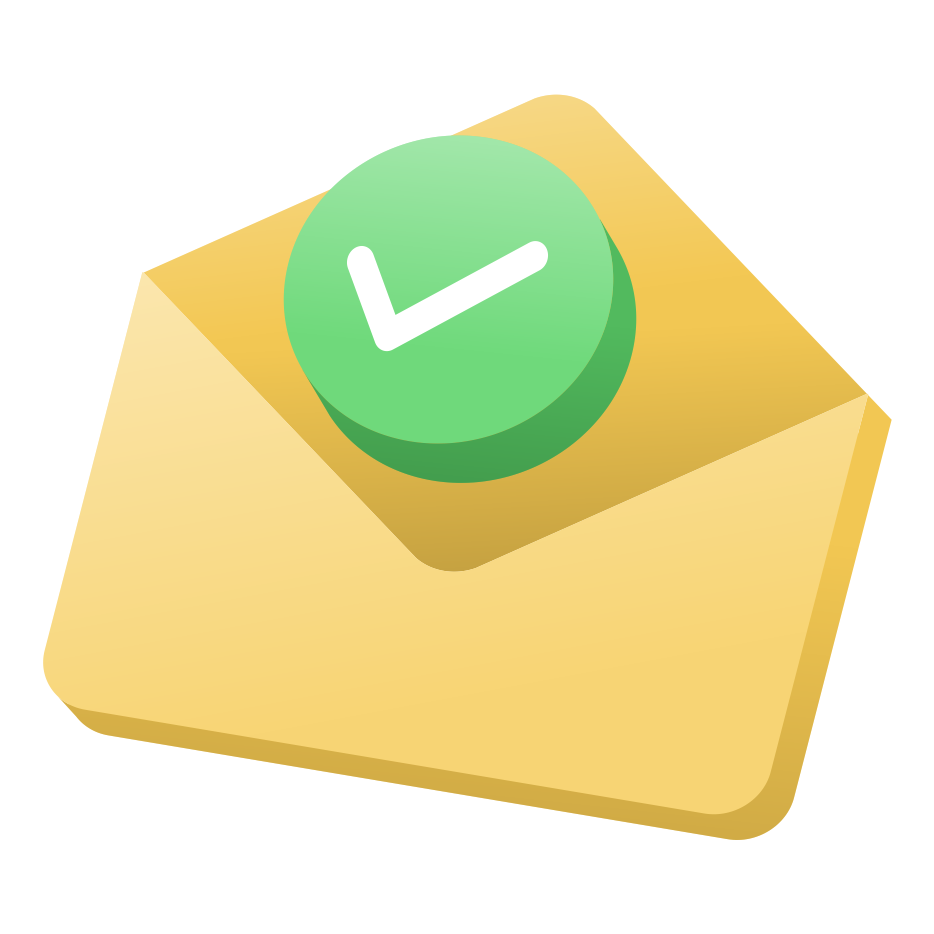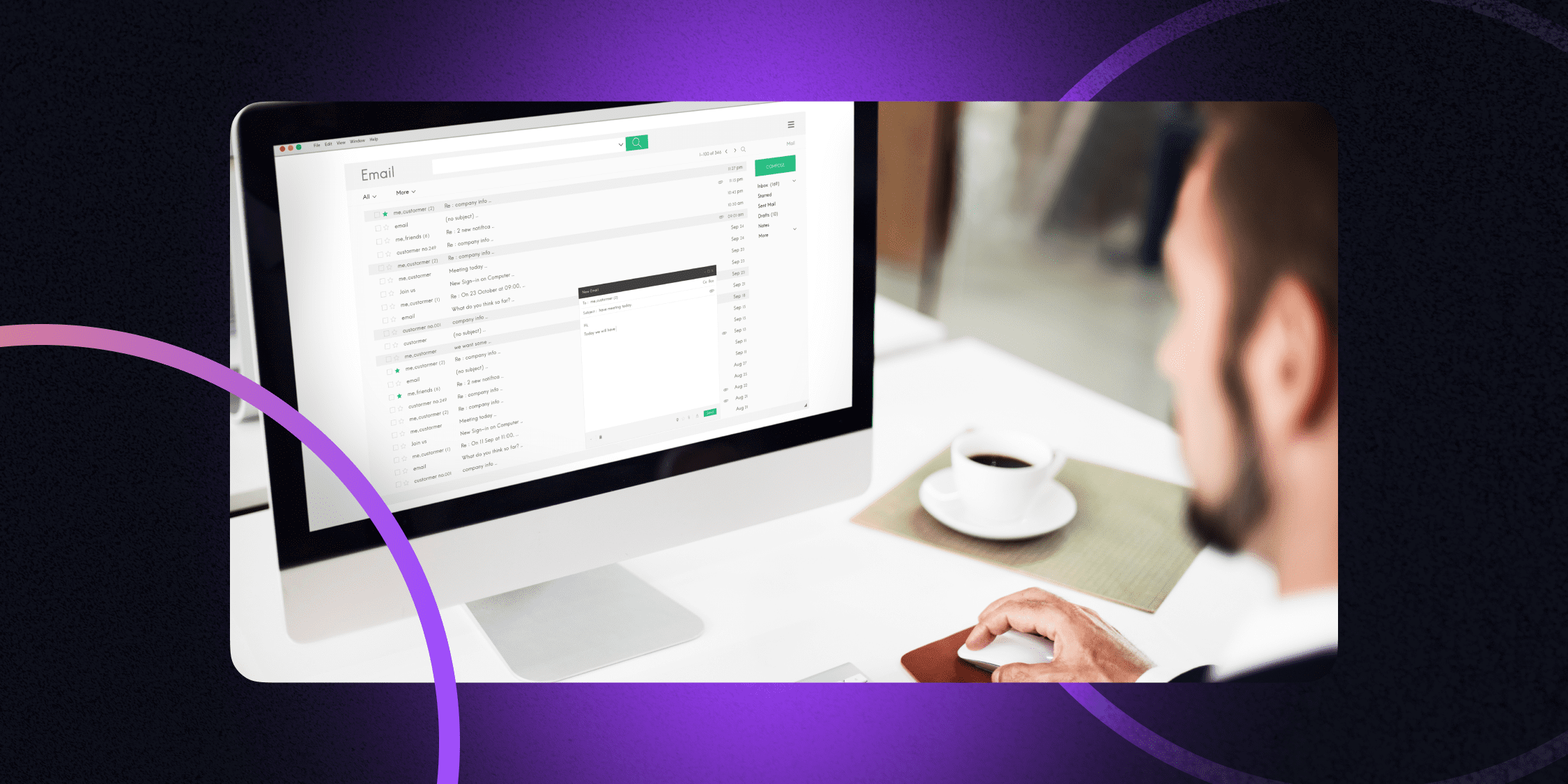In one of our previous posts, we provided you with useful email templates for scheduling an interview with a prospect. In this article, let’s talk about a broader problem – how to successfully use emails for requesting any business meeting.
I’ll share some ready-made meeting request email templates you can add to your collection and tips on asking for availability for a meeting.
But let’s start with the meeting request email definition. What is so special about this type of email?
What is a meeting request email?
A business meeting request email is an email you send to ask for an appointment with someone. This can include your prospect, current customer, business partner, potential influencer, investor, team, and others.
There are many reasons you may want to send a meeting request email, for example:
- Making a sales pitch
- Attracting an investor to your product
- Following up with business leads and more.
In this post, we’ll focus more on how you can successfully use email for requesting meetings with your potential customers. The templates and tips I’ll provide will also work fine for other targets – with minimum customization.
|
💡 Pro-tip Ensure your meeting requests actually reach your recipients by using email checker tools. You don’t want to waste time and resources on inactive email addresses, right? |
Benefits of sending meeting request emails
Of course, there are other ways to ask for a meeting: you can do it by phone or in person. But requesting a meeting through email proves to be the most effective way, and here is why:
It’s trackable
If you want a successful business deal, you should get used to a rigid way of communication. Not any detail should be missed out.
Unlike on-the-spur conversations or calls, email allows you to easily track your correspondence and get back to it whenever needed. Thus, you and your interlocutor can always stay on the same page and plan the deal according to the email thread history.
It’s convenient
In business, you should be extra careful with people you’re going to cooperate with, whether that’s a sales prospect or potential partner. Any pressure on them can cost you lost deals or contact breaches.
Email is the best way to maintain healthy business relations while requesting a meeting – you can find the most appropriate tone and language to address a person, while they can plan their response without feeling embarrassed or pressed for time.
It’s effective
The majority of business deals are now handled online. Chances you’ll meet with a targeted person at a sales conference or any other business event and have face-to-face communication are relatively low.
And speaking about calls, I doubt your potential customer or investor will be ready to answer them immediately or answer your follow-up calls at all. Not a surprise that 9 out of 10 people want to use messaging to interact with businesses.
How to structure a meeting request email
Let’s look at the anatomy of your business meeting request emails.
Subject line
Before writing a business meeting request email, think about a catchy subject line that will tempt a recipient to open your message. Here I advise you to refrain from long, complicated subject lines – busy people you’ll be writing your emails to won’t bother to read them. Stick to something not complex but catchy and personalized, for example:
- What about a meeting next Tuesday? (suitable for quick responses)
- Are you free on Friday afternoon? (informal)
- Requesting a meeting at your best convenience (formal)
- I know you are busy, [Name], but I need your opinion (personalized and appealing to the recipient’s expertise)
- We’d better discuss it this week (creating a sense of urgency)
- Are you available for a short discussion? (intriguing)
- I have something special to share with you (appealing to the feeling of exclusivity)
Need more subject line ideas for your business emails? Find them in one of the Snov.io posts.
RAP model for email body and sing-off
Don’t create long-reads. Instead, your email should be brief yet meaningful. I’ve read thousands of emails and, pretty often, people tend to beat around the bush instead of making it all up to a point.
To avoid this popular unhealthy trend, I recommend applying the RAP method, which has proven helpful in structuring the body of a business meeting request email.
I know, there might be some good old Eminem’s song playing in your head at the moment, but RAP is something different in email marketing. This is an abbreviation for 3 key bricks each of your business meeting request emails should stand on:
R = Reason
Dedicate the first few lines of your meeting invitation email to provide a clear overview of the meeting’s purpose. Your recipient should understand why you’re emailing them and how their presence will impact the meeting.
Consider the example:
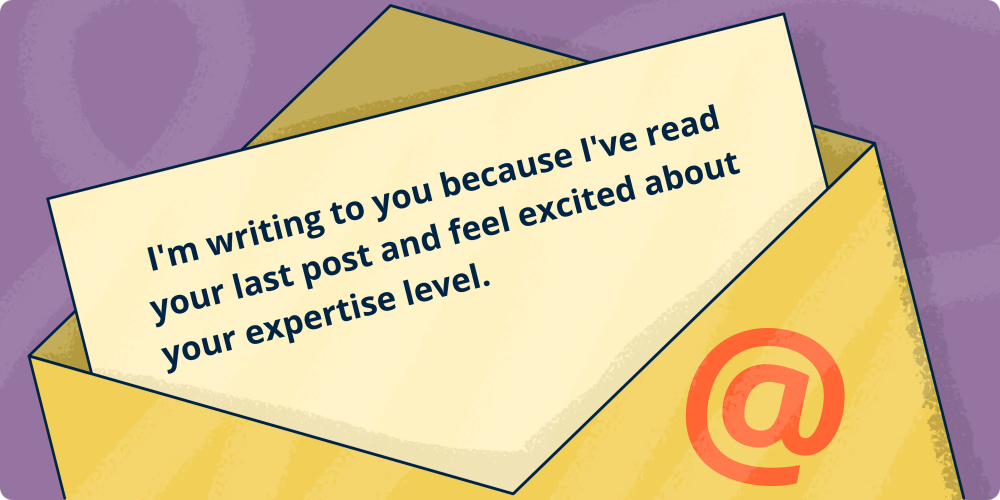
A = Action
What follows is a kind of call to action that would encourage your email recipient to continue communication, shifting it to the form of a business meeting. As a rule, this part of an email tells your addressee the meeting details, such as the date, time, meeting type (online or offline), channel (for online meetings), or physical location (for offline meetings).
For instance:
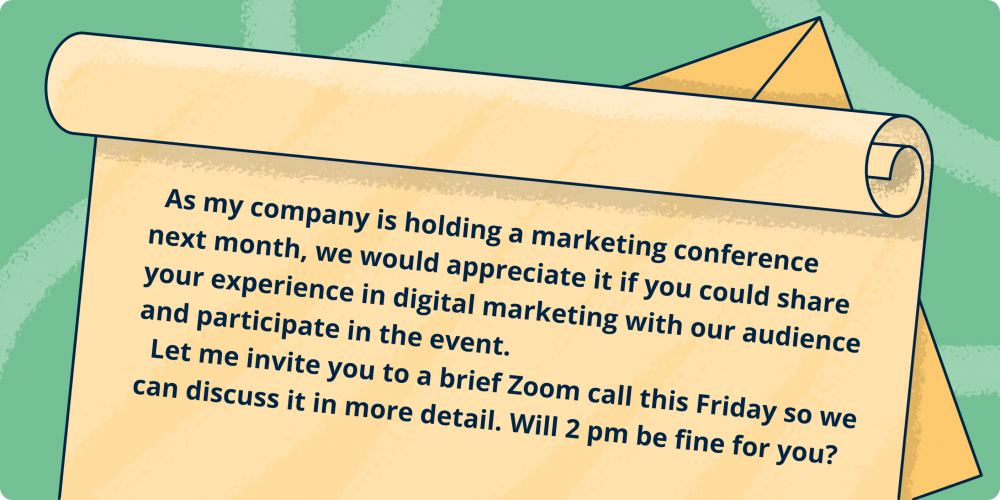
P = Professional ending
You should crown your meeting request email with a sign-off that will tie everything together and leave a pleasant aftertaste, so the person you’re writing to will be more inclined to respond to your request positively. The general rule of thumb here is the following: your ending must fit the general tone of your email. Say, if your email body is formal, don’t use an informal sign-off.
Feel free to find the best ways of writing a professional email signature in one of our posts.
How to ask for availability for a meeting: examples and tips
In this section, I’ll provide you with actionable meeting request email tips and templates.
Choose a proper style for your cold email
Cold outreach has never been easy. If it’s your first time contacting your leads, your emails should be almost perfect to make people want to open and react to them, let alone accept your meeting invitation.
The first thing you should do is determine what communication style is most relevant to your prospect. Do some research to find out how they prefer communicating, formally or informally, and adjust the tone of your meeting invitation request email accordingly.
I suggest you add both formal and informal meeting request email samples to your template list.
Formal sample: meeting request email example # 1
|
Subject line: Requesting a meeting at your best convenience Dear [Recipient’s name], I’m [Your name], working as [Your position] at [Your company name]. Our company specializes in [Your mission], and we’ve helped such companies as [Examples of companies that are recipient’s competitors] to [Describe how you’ve helped these companies solve their pain points]. I’ve researched your company on LinkedIn and see that [State a recipient’s main pain point]. I believe we could collaborate to [Describe the solution of a recipient’s pain point]. I’d like to invite you for a brief meeting to discuss this further. Will [Date and time] be convenient for you? Looking forward to hearing from you, [Your name] |
If your prospect appreciates a less formal communication style, try to win their attention with an easy-going meeting request email:
Informal sample: meeting request email example # 2
|
Subject line: What about a quick chat? Hi [Recipient’s name], I’m [Your name], working as [Your position] at [Your company name]. Our company specializes in [Your mission], and we’ve helped businesses like yours to [Describe how you’ve helped these companies solve their pain points]. What if we have a brief talk and discuss how our solution can help your company? Will [Date and time] suit you? Regards, [Your name] |
Note: No matter what style of communication your cold email conveys, ensure you start by introducing yourself. Remember, you’re contacting a person for the first time – they should understand who is talking to them and see the logic behind your meeting request.
Use a hook
Business people are probably the most reluctant email readers in the world. It’s natural as they have no time for things that don’t resonate with their current needs and goals. So, you have a pretty challenging task while sending them your meeting request email – grabbing their attention from the very start.
A solution?
You need a good hook…
There needs to be a sentence or two at the beginning of your message that will make your recipient read it further and agree to meet with you.
One way to catch their attention is to demonstrate that you’ve spent time learning about what they’re doing, their objectives, needs, and pain points. Marketers like calling it ‘doing your homework,’ meaning you need to do extensive research on the company whose representative you’re going to invite for a meeting.
Consider an example of a meeting request email that will help demonstrate you’re not a stranger passing by your prospect’s Inbox – you do know what air they breathe.
Meeting request email sample #3
|
Subject line: Are you available for a short discussion? Hi [Recipient’s name], I’m [Your name], working as [Your position] at [Your company name]. Our company specializes in [Your mission]. I’ve seen your recent post on LinkedIn and see that [State the recipient’s main pain point]. I believe we could collaborate to [Describe the solution of a recipient’s pain point]. I’d like to invite you for a brief meeting to discuss this further. Will [Date and time] be okay for you? Hope to meet you soon, [Your name] |
As you see from this template example, you can easily do your research about the prospect on LinkedIn. Just go to their page and read the information they post to understand better what their company is striving for and how they prefer to collaborate.
Another way to hook your email recipient is to tell them about their competitors. If you’ve helped any other companies like theirs, don’t miss a chance to mention it just from the start. This will signal to your prospect that they might be missing something valuable, something they’ll learn while meeting with you.
Meeting request email sample #4
|
Subject line: Meeting request in your Inbox Hi [Recipient’s name], I’m [Your name], working as [Your position] at [Your company name]. Our company specializes in [Your mission], and we’ve helped such companies as [Examples of companies that are recipient’s competitors] to [Describe how you’ve helped these companies solve their pain points]. I’ve found out about your company and believe you’ll have everything to achieve even better results with just a bit of help from [Your company]. What if we have a quick talk on [Date and time], and I’ll tell you more about the offering? Will this date and time suit you? Regards, [Your name] |
FOMO (fear of missing out) is one of the best psychological strategies to hook the attention of your email recipient. Don’t neglect it in your meeting request email.
Emphasize the value of a meeting
If you want a recipient to accept your email invitation, you need to persuade them your meeting will bring them real value. There’s a certain trick to doing this.
First, stress their pain points and tell them there’s a way out of their problem. Then mention your solution, adding its several benefits as a tease. Finally, create intrigue and invite them for a meeting where they’ll be able to learn further details.
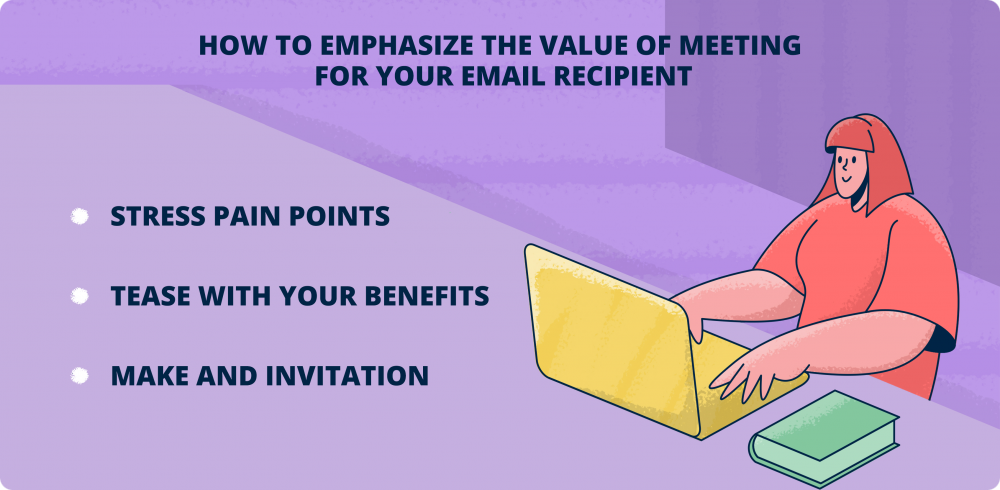
Let’s look at how you can use this technique within your email template:
Meeting request email sample #5
|
Subject line: Are you available to discuss [Your prospect’s company] key challenge this week? Hi [Recipient’s name], I’m [Your name], working as [Your position] at [Your company name]. Our company specializes in [Your mission]. I’m impressed by how fast [Recipient’s company] has achieved such growth. That’s awesome! Of course, I understand how problematic it is to [Describe your prospect’s key pain point] while pursuing such ambitious goals. What if I tell you, [Your company] can help you [Describe how you’ll solve a recipient’s pain point] within [How long] only? This is more than real. I suggest we have a quick talk this week to discuss it in more detail. Will [Date and time] be okay for you? Have a great day, [Your name] |
Don’t mention your prospect’s pain point right at the beginning of your email. Start it with a small compliment. This psychological trick helps you win over the recipient, so when you reach the point of asking for a meeting, they already have positive feelings about you.
Ask questions
If you want to create a meeting request email that will convert, make it engaging!
One of the simplest ways to do this is to ask questions. This way, you let your recipient imagine they’re already answering them. This creates the effect of dialogue in your email message and the feeling this dialogue should logically continue – at your meeting, of course.
Take a look at the meeting request email template you can use in this case:
Meeting request email sample #6
|
Subject line: Your expert opinion is highly needed Hi [Recipient’s name], I’m [Your name], working as [Your position] at [Your company name]. I’ve learned much about [Recipient’s company] on LinkedIn and see you’ve got lots of experience you can share. Do you use [Type of a product/service your company specializes in] at your company? Have you ever considered optimizing your solution for [Describe a recipient’s main pain point]? At [Your company], we [State your mission]. What if [Your product] can help you [Mention how you’ll help a recipient solve their problem]? I’d like to meet briefly with you to discuss it in more detail. Will [Date and time] be okay for you? Regards, [Your name] |
People like it when others treat them like experts. Asking questions is one of those tricks to provoke further conversation with a recipient.
Provide meeting options
Another way to engage your email recipient and get them to accept your meeting invitation is to create an illusion that it is they who choose to have a meeting with you.
For instance, you can provide alternatives for the date or time of a meeting, the channel of communication (e.g., Zoom or Skype), or even topics for further discussion.
Here’s a template you can use as a part of your meeting invitation strategy:
Meeting request email sample #7
|
Subject line: Have time for a quick meeting? Hi [Recipient’s name], I’m [Your name], working as [Your position] at [Your company name]. Our company specializes in [Your mission]. I’m impressed by how fast [Recipient’s company] has achieved such growth. But fast-growing businesses like yours usually experience such challenges as:
Could you please share which of these problems seems most acute for your business? Let’s have a quick talk to discuss it in detail. I feel you can significantly benefit from using [Your product]. Would either [Date and time] or [Date and time] work for you? Kind regards, [Your name] |
As you see, the recipient is given options: they can choose a better time for a meeting and the pain point they prefer to discuss. It looks like they rule the game, but you know, it’s you 😉
Use numbers
People love numbers. Business people can’t live without numbers, as they’re used to dealing with money, analytics, and statistical data. And they’re also particularly sensitive to wasting personal time on petty things. Why not use these qualities in your meeting request email?
While describing how your prospect will benefit from your cooperation, be specific: state how much revenue they’ll see and in what period. Besides, mention how long your meeting will last to assure your email recipient they won’t lose precious hours yet gain a lot of value in return.
You can do it right in your subject line like in the following example:
Meeting request email sample #8
|
Subject line: I need only 10 minutes of your time, [Recipient’s name] Hi [Recipient’s name], I’m [Your name], working as [Your position] at [Your company name]. We specialize in [Your mission], and we’ve helped such companies as [Examples of companies which are recipient’s competitors] to [Describe how you’ve helped these companies solve their pain points using numbers and percentages]. I believe we could collaborate to [Describe how you’ll help the recipient solve their pain points using numbers and percentages]. I’d like to invite you for a 10-minute meeting to discuss this further. Will [Date and time] be okay for you? Hope to meet you soon, [Your name] |
Just keep in mind: whenever you provide any statistics or other data, it must be super relevant to the prospect. Add only those numbers that your email reader will be indeed interested in.
Follow up
The last but not the least important hack I’d like to share is actually not a hack – it’s a postulate.
Do. Follow. Up.
Your initial meeting request email has been ignored? Well, there can be dozens of reasons a prospect is silent. Just send them a reminder to show you’re patiently waiting for them to accept your meeting request.
Here’s an example of a follow-up email sample requesting the meeting:
Meeting request email sample #9
|
Hi [Recipient’s name], I requested a meeting with you [When?], but haven’t heard back from you. I understand you are busy, so I don’t want to bother you. Just a reminder: if you think a 15-minute talk about your [Restate a recipient’s pain point] makes sense, let me know what your calendar looks like. Looking forward to hearing from you, [Your name] |
Following up must become your daily email marketing practice on your way to closing business deals, so add a portion of good follow-up email templates to your collection.
Wrapping up
If you want to request a meeting with your prospect or potential business partner, email is the most effective means. It’s trackable, gives more freedom to think it all over, and offers you to prepare your invitation compellingly. I hope the hacks and email samples I’ve provided in this post will help you create your own irresistible meeting request emails.
And if you need a platform that will streamline your email communication and LinkedIn outreach, care about personalization, and send timely follow-ups for you, Snov.io is without a doubt a number one choice. Combine Snov.io cold email features with its CRM power, and you’ll get everything you need for successful outreach.

